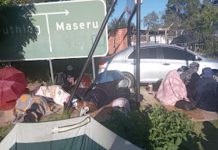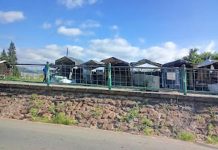Africa-Press – Lesotho. Parliament’s Portfolio Committee on natural resources, tourism, and land has recommended that the Lesotho Highlands Development Authority (LHDA) revise its compensation policy to address ongoing conflicts with communities affected by the Lesotho Highlands Water Projects. This recommendation stems from recent events where several communities were relocated from Ha Katse to Ha Makhalanyane without receiving any compensation, significantly impacting their livelihoods.
The Ha Makhalanyane community is now advocating for the distribution of M3 604 218.59 in compensation for the impact of the Lesotho Highlands Water Project (LHWP) on their fields and pastures among its members. The Lesotho Highlands Water Project (LHWP) is a multi-phase initiative aimed at providing water to the Gauteng region of South Africa and generating hydroelectricity for Lesotho.
Originating from the 1986 Treaty signed by the governments of the Kingdom of Lesotho and the Republic of South Africa, the project entails harnessing the waters of the Senqu/Orange River in the Lesotho highlands through the construction of several dams. Its goal is to achieve mutual benefits for both countries. Phase I was completed in 2003 and inaugurated in 2004, with Phase II currently underway.
During the recent forum, it was noted that a total of M29 billion has been allocated for projects from 2019 to the present, providing employment for at least 10,000 individuals. However, challenges such as delays in compensating funds and implementing community development infrastructure projects like water tap construction and electricity installation were identified as the main hurdles faced by the LHDA.
Section 11.5 of the LHDA Compensation Policy of 1997 states that all communal assets will be compensated through lumpsums or annual cash payments to communities as a whole, with the funds intended for development purposes within the communities. Additionally, funds allocated for communal assets should be based on the number of households resettled or relocated.
This week, Moeketsi Motšoane, the chairperson of the portfolio committee on natural resources, tourism, and land clusters, called on the LHDA to revise its compensation policy. Motšoane said the current policy is unbalanced, leading to mismanagement of compensation and hindering the achievement of its objectives.
He noted that the policy’s impact on numerous individuals necessitates a re-evaluation, as it often results in prolonged disputes between the affected communities and the LHDA, requiring significant time for resolution. “LHDA’s desire to establish successful cooperatives is hindered by its limited capacity. To address this issue, I propose providing financial assistance to the affected individuals, allowing them to make independent decisions on how to utilise the funds and move forward with their lives,” he said.
In response to the issue, the LHDA Resettlement and Development Branch Manager, Morake Rakhoba, clarified a letter received from 16 villagers who were scheduled for relocation. He said the villagers expressed their preference to receive the money directly rather than having it used for development purposes.
Rakhoba clarified that LHDA informed the villagers that it was not in line with the authority’s compensation policy to distribute money to individual villagers. Previously, LHDA hosted a two-day forum to discuss their 10-year strategy, aimed at creating sustainable socio-economic benefits through the development and management of water resources and electricity generation in Lesotho.
For More News And Analysis About Lesotho Follow Africa-Press






